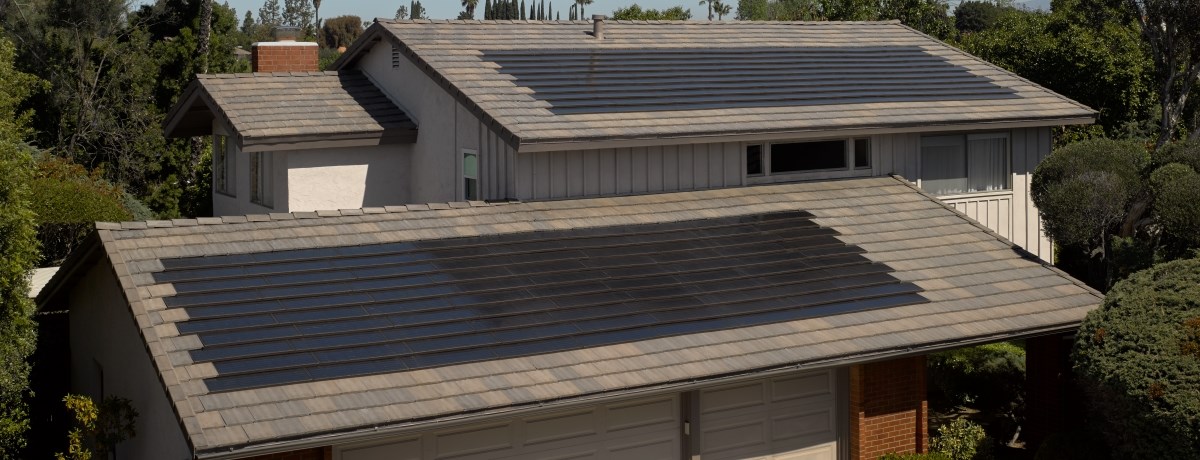Before Elon Musk shook up the home solar power industry with the Tesla solar roof, homeowners and businesses were talking about solar shingles. The current leader in solar shingles is CertainTeed, whose solar roof products can be integrated as part of your existing roof.
What are CertainTeed solar shingles, and how do they work?
Solar shingles, also known as “building-integrated photovoltaics” (BIPV), are roof-shingle sized solar panels. CertainTeed’s solar roofing product is made of the same solar technology as traditional solar panels – monocrystalline solar photovoltaic cells.
However, unlike traditional solar panel systems, which are affixed to the roof with a racking system, CertainTeed solar shingles are installed as an integrated part of your existing roof. The result is a low profile, unobtrusive solar energy system that sits flush with your roof tiles.
CertainTeed offers two solar shingle options: the Apollo II system and the Apollo Tile II. Both options provide the same power production – 14 solar cells for a total of 60 watts. The Apollo II system is designed to integrate with asphalt shingle roofs, while the Apollo Tile II is designed to suit roofs with concrete tiles.


How CertainTeed solar shingles compare to other solar options
Solar shingles offer a sleek, low-profile solar option for many homes, but they may or may not be the perfect fit for your home. Here’s how they compare to traditional solar panels, as well as new solar roofing options.
Performance
CertainTeed solar shingles are based on the same fundamental solar technology as both standard solar PV panels and other solar roofing options: silicon solar photovoltaic cells. However, because of the nature of the product, CertainTeed’s solar shingles will produce less electricity than a similarly sized roof-mounted solar panel system.
According to CertainTeed’s product specifications, the Apollo II system has a conversion efficiency of 15.4%, and the Apollo Tile II system has a conversion efficiency of 16%. These statistics are on the low end for standard solar panels, which can offer efficiency ratings between 16% and 20% on average.
This is due to the fact that building-integrated solar panels don’t have air circulating underneath the solar cells to cool them. Like other electronic equipment, solar panels can overheat. While this style of installation does create a low-profile look, it also comes with lower electricity production.
Installation process
A traditional solar panel installation can be completed in a matter of hours–but the installation process for CertainTeed solar shingles is more complex. According to the company, their shingles “function both as the roof covering and the solar PV collector.” However, unlike Tesla’s solar roofing options, CertainTeed’s offering is designed to work with your existing roof, which means that it doesn’t require a full roof replacement.
Aesthetics
If your primary concern is finding a truly “hidden” solar power installation, Tesla is the main company offering a “solar roof” with solar cells that are invisible from ground level. However, because CertainTeed shingles are integrated into the roof, rather than installed on top of it, they are much lower profile than a standard solar panel system.
Price
In the world of home solar, the lowest cost option – and the one that offers the greatest long-term savings – will most certainly be a standard solar panel system.
EnergySage analyzed Tesla’s solar roofing data and found that their product cost approximately $6.40/Watt, including the cost of non-solar roofing materials needed to complete the installation. Certainteed doesn’t make specific pricing information available on their website. However, the complexity of installation means that we can expect their system cost to fall somewhere between a standard solar system and a full solar roof.
Warranty
According to CertainTeed’s website, the Apollo II and Apollo Tile II products both come with the following warranties:
- Installation & workmanship: 25 years
- Inverter & other components: 10 years
- Power output: 25 years
- Wind warranty: 10 years
These warranties are comparable to other options within the solar industry. Tesla’s warranty ist stronger – they offer 30-year warranties for power production and weatherization. Tesla also offers an “infinite” warranty that applies to their physical roof tiles.
Availability
Availability is an area where CertainTeed stands out from other solar roofing options. Tesla’s solar roof product is only available in select test markets in California, with no indication of when they will be rolled out in other parts of the country. CertainTeed’s product is currently available across the country through its network of installers.
Start the solar shopping process today with solar panel quotes on EnergySage
Solar shingles offer a nice compromise between the aesthetically pleasing, costly solar roof and a standard solar panel system. However, the aesthetic benefits of a CertainTeed installation come with some compromises on electricity production and cost. In many cases, a standard solar panel system is a much more cost-effective option for your home. The average EnergySage customer with a solar panel system breaks even on their solar investment in just seven years.
If you’re considering a solar roof, CertainTeed solar shingles, or standard rooftop panels, comparing all of your options can help you determine the relative costs and benefits of going solar. Join the EnergySage Solar Marketplace to solicit competitive quotes for rooftop solar PV systems from installers local to you. Whether your top priority is aesthetics, long-term savings, or initial investment, reviewing offers from multiple providers is the best way to find the right option for your home.






